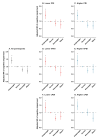Association of Body Mass Index and Plant-Based Diet with Cognitive Impairment among Older Chinese Adults: A Prospective, Nationwide Cohort Study
- PMID: 35956314
- PMCID: PMC9370436
- DOI: 10.3390/nu14153132
Association of Body Mass Index and Plant-Based Diet with Cognitive Impairment among Older Chinese Adults: A Prospective, Nationwide Cohort Study
Abstract
To examine the association of body mass index (BMI) and a plant-based diet (PBD) with cognitive impairment in older adults, this cohort study used data from the Chinese Longitudinal Healthy Longevity Survey (CLHLS), a national, community-based, longitudinal, prospective study in China. Cognitive function was evaluated via the Mini-Mental State Examination (MMSE). Diet was assessed using a simplified food frequency questionnaire (FFQ), and PBD patterns were estimated using the overall plant-based diet index (PDI), the healthful plant-based diet index (hPDI), and the unhealthful plant-based diet index (uPDI). BMI was measured objectively during the physical examination. Cox proportional hazard models and restricted cubic spline analyses were used. A total of 4792 participants with normal cognition at baseline were included, and 1077 participants were identified as having developed cognitive impairment during the 24,156 person-years of follow-up. A reverse J-shaped association was observed between BMI and cognitive impairment (p = 0.005 for nonlinearity). Participants who were overweight (HR = 0.79; 95% CI 0.66-0.95) and obese (HR = 0.72; 95% CI 0.54-0.96) had a decreased risk of cognitive impairment, while those who were underweight (HR = 1.42; 95% CI 1.21-1.66) had an increased risk. Lower PDI, lower hPDI, and higher uPDI were associated with an increased risk of cognitive impairment (HR = 1.32; 95% CI 1.16-1.50 for PDI; HR = 1.46; 95% CI 1.29-1.66 for hPDI; HR = 1.21; 95% CI 1.06-1.38 for uPDI). The protective effect of being overweight on cognitive impairment was more pronounced among participants with a higher PDI (HR = 0.74; 95% CI 0.57-0.95) than those with a lower PDI (HR = 0.87; 95% CI 0.67-1.12), among participants with a higher hPDI (HR = 0.73; 95% CI 0.57-0.94) than those with a lower hPDI (HR = 0.93; 95% CI 0.72-1.10), and among participants with a lower uPDI (HR = 0.61; 95% CI 0.46-0.80) than those with a higher uPDI (HR = 1.01; 95% CI 0.80-1.27). Our results support the positive associations of overweight status, obesity, an overall PBD, and a healthful PBD with cognitive function in older adults. A lower adherence to an overall PBD, a healthful PBD, and a higher adherence to an unhealthful PBD may attenuate the protective effect of being overweight on cognitive function.
Keywords: body mass index; cognitive impairment; cohort; older Chinese adults; plant-based dietary pattern.
Conflict of interest statement
The authors report no conflict of interest.
Figures



References
-
- Alzheimer’s A. 2018 Alzheimer’s disease facts and figures. Alzheimers Dement. 2018;14:367–425. doi: 10.1016/j.jalz.2018.02.001. - DOI
MeSH terms
LinkOut - more resources
Full Text Sources
Medical

